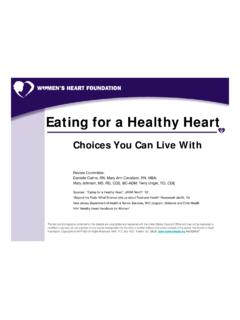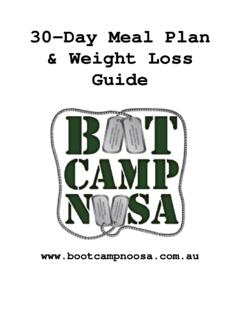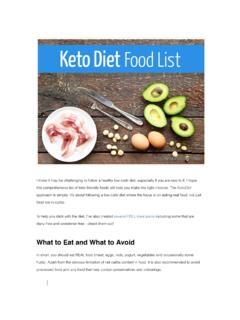Transcription of I S THIS ANY WAY TO LOSE WEIGHT?
1 2/11 INTERVIEW BY LISA DAVIS IS THIS ANY WAY TO LOSE WEIGHT? Actually, yes. Award-winning science journalist Gary Taubes explains (finally!) why conventional diets don t work and what you can do to lose obesity researchers are so smart, why are we so large? That s the question at the heart of Gary Taubes s new book, Why We Get Fat and What to Do About It. After all, public health authorities have been hammering home a very simple message for the past 40 years: If you don t want to be fat, cut the fat from your diet. And in those years, obesity rates have gone from 13 percent to 22 percent to, in the last national survey, 33 percent. IPHOTOGRAPHED BY ERIK RANK; FOOD STYLING BY MARGARETTE ADAMS/MARNIE ROSE 2/11most assuredly true. Taubes sat down with our health editor, Lisa Davis, to share the Reader s Digest Version of his theory.
2 Here s what he wants you to know. THE OBESITY EXPERTS ARE WRONG. There s this absolutely fundamen-tal idea when it comes to weight and obesity that the way we get fat is that we take in more calories than we expend. It s the gluttony and sloth hypothesis: We eat too much and ex-ercise too little. It sounds undeniable, as commonsensical as can be, and it s actually nonsense it doesn t tell us anything meaningful about why we get fat. If I get fatter, it s obvious that I must have overeaten. But if you ask the question, Why did you overeat? Well, that question I can t answer not with the calories-in/calories-out theory of weight gain. People react to this as though I m questioning the laws of thermo-dynamics. I m not questioning them; I m saying they re not relevant. Yes, if you re getting fatter, you re taking in more calories than you re burning the question is why.
3 There s a ridicu-lously simple alternative hypothesis, which is that you don t get fat because you re overeating. You overeat be-cause you ve developed a disorder in the way your fat tissue is regulated. DIETS DON T WORK. Over the past 40 years, studies have shown that you can t get a clinically Taubes thinks he knows why: Obe-sity experts have gotten things just about completely backward. If you look carefully at the research, he says, fat isn t the enemy; easily digested carbohydrates are. The very foods that we ve been sold as diet staples fat-free yogurt, plain baked potatoes (hold the butter), and plain pasta (hold the olive oil, sauce, and cheese) actu-ally reset our physiology to make us pack on the pounds. And the foods that we ve been told to shun steak, burgers, cheese, even the sour cream so carefully scraped from that potato can help us finally lose the weight and keep our hearts healthy.
4 As you might imagine, Taubes has stirred controversy with his conten-tions. Though he s known as an obses-sive reporter and a science nerd (he studied applied physics at Harvard and aerospace engineering at Stanford and has won numerous science-writing awards), he s been called a dangerous cherry picker of data someone who searches through decades of studies to weave together the bits he likes. But a series of studies in the past five years has compelled researchers to rethink their long-held prejudices against low-carb diets. These days, scientists like Mitchell Lazar, MD, who directs the diabetes institute at the University of Pennsylvania, and cardiologist Allan Sniderman, MD, at McGill University, take Taubes s argument very calls his ideas just an alter-native hypothesis for why we get fat. Then, with trademark confidence, he adds that this radical rethinking is al-113you to eat less how much good is that going to do?
5 If you cut calories, you ll be hun-gry all the time that s a given. But what also happens is that you adjust your energy expenditure to match your reduced intake. Studies in ani-mals show that if you restrict energy intake, their cells actually burn less energy, which is one reason that obe-sity researchers, in their honest mo-ments, acknowledge that restricting calories is ineffective. IT S IMPOSSIBLE TO COUNT CALORIES. Public health authorities want us to practice energy balance, which is a new way to say that you shouldn t take in more calories than you expend. So what does energy balance entail? significant effect from cutting calo-ries. At the same time that experts are saying that gluttony and sloth are re-sponsible for weight gain, they ll tell you that we know no diet works, and that s why we have to come up with some anti-obesity drug that ll make billions.
6 That s why the medical community considers bariatric sur-gery actually altering your digestive system a reasonable solution. It shouldn t be a surprise that di-ets don t work. Obese people have spent their lives trying to eat less. There are probably a few people who gave up early and said, This is hope-less and I m going to have a good time. But for the most part, you can define an obese person as someone for whom eating less didn t work. So the simple fact that a doctor tells What we tell people to do to lose weight eat less and exercise is exactly what you d do if you wanted to make yourself 2/11(BUTTER) MICHAEL ROSENFELD/GETTY IMAGES; (PASTA) DAVIES AND STARR/GETTY IMAGES; (BRUSSELS SPROUT) JUSTIN LIGHTLEY/GETTY IMAGES; (ORANGE) EVGENIE IVANOV/GETTY IMAGES; (BACON) JAMES AND JAMES/GETTY IMAGES If you consume about 2,700 calo-ries a day, which is typical if you aver-age men and women together, that s a million calories a year, or ten million calories in a decade.
7 Over the course of a decade, you re eating roughly ten tons of food. How accurately do you have to match calories-in to calories-out so that you don t gain more than 20 pounds over the course of a de-cade? Because if you gain 20 pounds every decade, you ll go from being lean in your 20s to obese in your 40s, which many of us do. And the answer is: 20 calories a day. If you take in an extra 20 calories a day and put it into your fat tissue, you will gain 20 pounds every decade. The point is, nobody can match calories-in to calories-out with that kind of precision. Twenty calories is like a single bite of a McDonald s hamburger. It s a couple of sips of Coca-Cola or a few bites of an ap-ple. No matter how good you are at counting calories, you can t do it. So if practicing energy balance is really the way to keep from getting fat, the question is, Why aren t we all fat?
8 EXERCISING WON T KEEP YOU THIN. People in nutrition are so keen on making us lose weight by exercising that they ve forgotten the fact that the more energy you expend, the hungrier you get. Imagine I asked Alice Waters, the great chef from Chez Panisse, to my house to make a 12-course feast, and you re invited. And I ve got a pastry chef coming and a gourmet butcher in Berkeley they The low-fat diet that people have beeneating in hopes of protecting their heart is actually bad for their (BUTTER) MICHAEL ROSENFELD/GETTY IMAGES; (PASTA) DAVIES AND STARR/GETTY IMAGES; (BRUSSELS SPROUT) JUSTIN LIGHTLEY/GETTY IMAGES; (ORANGE) EVGENIE IVANOV/GETTY IMAGES; (BACON) JAMES AND JAMES/GETTY IMAGES5 WAYS TO GET STARTEDEric Westman, MD, who directs the Duke Lifestyle Medicine Clinic in Durham, North Carolina, and who cowrote The New Atkins for a New You, has been studying low-carb diets for 12 years.
9 His five guidelines: 1 DON T TRY TO LIMIT FAT. Eating high-fat foods keeps you from feeling deprived, says Dr. Westman. Bacon, cheese, heavy cream, sour cream, cream cheese, mayonnaise, butter, and oil are all healthy parts of a low-carb diet. 2 SAY GOODBYE TO PASTA, BREAD, AND RICE. To lose weight , most people have to stay under 20 grams of net carbs per day (net carbs refers to the number of grams of carbs minus grams of fiber, because fiber doesn t send blood sugar spiking). That rules out bread (two slices contain about 24 grams of net carbs), rice (over 40 grams in a cup), and pasta (about 40 grams per cup). Once you hit your goal, you can slowly add in more carbs that don t have a big impact on blood sugar. 3BE PICKY ABOUT VEGETABLES. Starchy (carb-heavy) vegetables most of the ones that grow underground, as well as corn are off-limits.
10 But you can have up to four cups daily of leafy greens such as lettuce, spinach, and collard greens. Limit broccoli, cauliflower, green peppers, okra, and Brussels sprouts to two cups per day. 4 SAY NO TO HIDDEN SUGARS. Fruit, that legend-arily healthful food, is packed with sugar, aka carbohy-drates. So are fruit juices. Other concentrated sources include soda, cakes, and candy. You may be able to keep diet sodas, light beer, dry wine, and sugar-free sweets on the menu and still lose AS MUCH AS YOU WANT. When it comes to protein and fat, you don t have to use portion con-trol, says Dr. Westman. Your hunger will go down automatically when you start eating this way all you have to do is stop eating when you re full. Beth Dreher 2/11have gourmet butchers now. Bring your appetite! The two things you re likely to do are that you might skip lunch, and you might exercise more.





